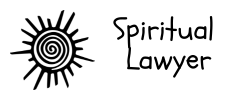Mark Deeks calls himself an atheist. Can he be spiritual nevertheless?
First I asked him what kind of religious background he grew up in. And he shared that 90% of his family is from a Christian background. Starting with a Church of Scotland background and moving into an Evangelical. For those of you who don’t know (I had to check this myself), Evangelical Christians are conservative protestants. Protestants being, Christians who are not under the authority of the Pope. Mark, however, does not related to the information I found about the Evangelical Church and simply refers to them as happy clappers and a more modern version of Christianity. His Dad’s grandfather was a preacher as were his dad’s dad and uncle.
Despite this, Mark describes himself as non religious, non spiritual and ultimately, an atheist and to him, it stems from just being practical as well as the experience of not being able to visualise, so if it’s not here, then it does not exist. When Mark did his PhD in Heavy Metal Music, he had a chance to explore myths and culture and he became fascinated by how men, in all parts of the world, try to explain things they don’t understand and can come to entirely different conclusions. And to Mark, religions are part of this search for meaning and he respects that. He has also had a chance to see first hand the extraordinary comfort that religion can bring to people. And despite that, Mark cannot accept that these experiences prove the existence of any god, be it Christian, Muslim or other. In a way, he wishes it did as it apparently brings a sense of belonging and meaning, but he just can’t. He doesn’t believe that God is the explanation. And therefore, Mark came to the conclusion he was atheist over time.
When I shared my definition of what spiritual means to me, which involves the desire to leave the earth a better place and to become a better person, Mark had some objections about that too. And the issues he has with always wanting to be better comes with his experience of the academic world. He was working in a college about ten years ago that had received several outstanding inspections in a row and instead of being satisfied with it, the college decided they were now aiming for “beyond outstanding”. Why can’t we just accept that some days we are great and other days we are average and simply accept our humanity.
Mark shared with us his belief that the need for religion or spirituality stems from a hole in us that yearns to explain everything that we are longing for and searching for. Personally, however, he does not feel he has a hole that needs to be filled. And it makes him uncomfortable around religious people or events because he does not want to be disrespectful, but the same time, he just can’t buy into it.
In a similar vein, Mark stays away from what he calls woo, because he doesn’t understand it at all and he tends to get the wrong end of the stick when he tries to get involved. We talked about how the spiritual community can get side tracked talking about concepts that are actually distractions from what is more important to our spiritual journeys, which are our values.
We then moved to the topic of meaning and leading a meaningful life. And Mark shared that he finds it really hard to acknowledge success in his life. However, part of what Mark does is to facilitate people’s musical dreams, as an unorthodox piano teacher. He does this through playing the piano at events, creating bespoke piano meditations, being part of a band or teaching people how to play.
And this has led Mark to think about his legacy, which in turn led to him creating an album called Arð, entirely to his own specifications with absolutely no compromise. Within two weeks of completing this passion project, he got a record deal with one of his favourite record labels. Hence, his dream of combining his two loves of piano and metal finally came to light. All in low baritone chorals, because that’s what he does. He does not scream like more mainstream metal singers do. And this project has given meaning to his life, more than the thousands of gigs that he has been to, or the choirs that he has run or even all the people he has taught piano to.
The second part of our interview focused on how music and art can be vehicles to feed the soul, whether we are spiritual or not and the importance of changing the mainstream approach to art as a way to excel. Mark is a mental health first aider, like me, and he is passionate about using art and music as a way to support our mental health.
Mark had a little rant about how classical music still dominates the teaching of music when it is not encouraging creativity, but rather perfectionism on a prescription. You can’t change the notes or the speed. It is just what it is. And that’s what is often presented as the only way to people who want to pursue music as a creative outlet. It also encourages perfectionism which can actually be detrimental to mental health.
Mark wants to teach a fun way to play the piano that actually supports mental health. A way that puts a smile on your face. Improvisation can bring that fun into the playing.
You can find out about his music on Facebook here. And about his business on Facebook here.
To listen to the episode in your favourite app, click here.

